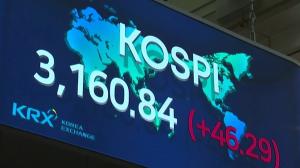Financial Authority “Net selling 3 trillion won a day even if the percentage of MSCI EM decreases by 1 percentage point”

Controversy over the’prohibition of short selling’ is raising concerns about reducing the weight of Morgan Stanley Capital International (MSCI) Emerging Countries Index (EM). As of the end of 2020, the MSCI EM follow-up fund is about 240 billion dollars (264 trillion won), and the proportion of Korea is 13.4% (35.37 trillion won).
Even if it is reduced by only 1 percentage point from this proportion, the stock price could fall by net selling of about 3 trillion won in one day from the quarterly change. MSCI’s index changes are scheduled for May. If short selling is not resumed in May, the period for banning short selling will pass for one year, and you can get a penalty.
It is reported that the party government has set a direction toward accelerating the timing of the decision as the market confusion has increased due to the recent remarks of the ruling party lawmakers about the successive short selling. Accordingly, it is known that there is a high possibility that a financial-related party government meeting will be held as early as next week or early next month to summarize the position on short selling.
According to the investment industry on the 23rd, the voice of warning about the outflow of large amounts of overseas funds is growing as an atmosphere has emerged, focusing on the politics, focusing on the extension of the’prohibition of short selling’ ending on March 15. This is because if the ban on short selling continues for more than one year, it is highly likely that Korea will be classified as a permanent country where short selling is prohibited in the global capital market, resulting in a low score in the investment environment and the proportion of investment in Korea may decrease.
For example, in Turkey last year, MSCI was warned of downgrading and relegation because the short selling system was not properly operated and related facts were not immediately communicated to foreign investors.At the end of the year, the proportion in EM was 1.07% from 1.41% to 0.34%. Points or lowered.
In this regard, Korea’s share in EM was 15.4% in 2017, but it fell to the 11% level in 2019 as China’s growth and Middle Eastern indexes such as Saudi Arabia and Qatar increased its share competitively. Last year, it recovered only 13% while overcoming the Corona 19 crisis. If MSCI, a global leading index, adjusts its weight, similar passive funds are also concerned about losses, leading to a chain of sell-offs.
In politics, there has been a movement to extend the ban on short selling due to concerns about a decline in stock prices, but historically, there are many cases where short selling did not lead to fears of falling stock prices. In particular, short selling has a net function of calming the stock price bubble, and there are concerns that even if the market has returned to normal, forcibly blocking the system may undermine the autonomy of the market.
Tesla is a representative example of the defeat of the short selling force. According to Samsung Securities on the 22nd, the share of short selling Tesla shares in the US as of the end of last year was 1.14%. Considering that Tesla’s share of short selling in October 2012 reached 44% and the share price was only $5, it can be seen that the share of short selling decreased as Tesla’s corporate value increased.
As the market eventually follows fundamentals in the long term, short selling orders or bans or resumes may cause temporary volatility, but do not create a trending downtrend. In fact, in Europe, which temporarily banned short selling last year and then resumed, the stock price on the day and after the resumption drew a relatively stable upward trend in accordance with the global stock market trend. This means that the Korean stock market is also unlikely to collapse due to the resumption of short selling.
On the other hand, while the ban on short selling, which is scheduled to end in March, has been extended due to an additional extension,’Hong Kong-style short selling’, which allows short selling for some stocks, is proposed as an alternative.
According to the Democratic Party and the financial authorities on the 23rd, the party is currently considering short selling only to some of the top stocks based on market capitalization and trading volume.
In particular, the ruling party cannot ignore the negative public opinion over short selling by individual investors ahead of the re-election for Seoul and Busan mayors in April. The government is drawing a line on the abolition of short selling, but considering a compromise excluding short selling for stocks that are concerned about a sharp price decline due to short selling due to relatively low liquidity.
Hong Kong-style short selling refers to the limited designation of stocks that can also be sold short. The Hong Kong Exchange designates short-selling stocks quarterly and allows short-selling of △underlying assets such as derivatives, △market-creating stocks, and stocks with a market capitalization and turnover of more than a certain size.
Although Hong Kong completely banned short selling, it has implemented a system for designating possible stocks in the process of gradually allowing short selling since March 1994. As of October 2019, short selling of 710 stocks and 230 fund stocks, which is 37% of about 1900 listed stocks in Hong Kong, is allowed.
Copyright © Consumer News Unauthorized reproduction and redistribution prohibited
